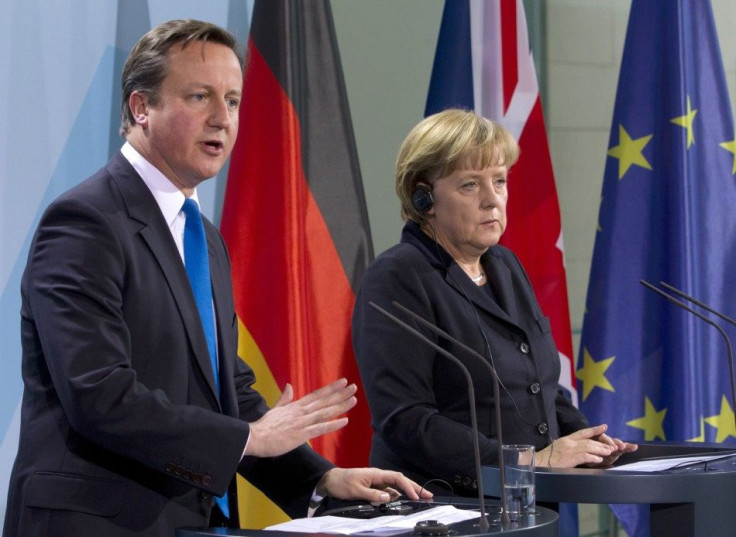Germany's Merkel and the UK's Cameron: She Said, He Said

While German Chancellor Angela Merkel and British Prime Minister David Cameron have tried to put a happy face on their Friday meeting in Berlin, the two prominent European leaders differ sharply on ways to resolve the Eurozone debt crisis.
For one thing, Merkel insists on pushing for a financial tax which many political and business figures in the U.K. fear will threaten the City of London, the British capital’s financial hub.
Germany and France want the European Union to levy a tax on every financial transaction that banks across the continent make, with the revenues generated to be earmarked to help troubled Eurozone members.
U.K. ministers believe such a tax would be disastrous for both British and European banks and would likely chase them away from the continent.
“The danger is driving transactions to a jurisdiction where it wouldn’t be applied,” Cameron said.
Merkel countered: “We are at one in saying a global financial tax would be introduced immediately. But on a European one, we did not make any progress on that one. We have to both work on where we both feel change is needed.”
The German Chancellor has also explicitly rejected a request by Cameron to give the European Central Bank (ECB) to play a dominant role in rescuing the debt-ridden peripheral Eurozone nations. Berlin is concerned that such an act would prompt inflation.
“All the institutions of the Eurozone have to stand behind and do what is necessary to defend it,” Cameron stated.
Again, in defiance, Merkel responded: “The British say we have to use all force available. One should not pretend to be more powerful than one is because the markets will know and find this out. Our task is to implement what we have decided on. There a few technical details that need to be worked out and every day counts to finally put this on track for us finally to put this on track. When you have lost confidence and the Eurozone has lost confidence, then this has to be regained step by step.”
However, Merkel reiterated that Britain and Germany will have to find a way to cooperate on these contentious issues.
“The fact that we are standing here before you makes it abundantly clear that the United Kingdom and Germany need each other,” she declared.
“We share a common opinion on how Europe can be successful, how we can preserve our prosperity.”
Similarly, Cameron told a conference: It is obvious that we don't agree on every aspect of European policy, but I am clear that we can address and accommodate and deal with these differences. It's a good relationship. We have strong agreement on key issues about action the European economy needs to take.
© Copyright IBTimes 2025. All rights reserved.





















